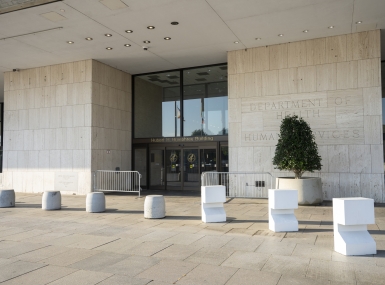NACo Commission on Mental Health and Wellbeing
Reimagining the Advancement of Mental Health Support for Americans

Launched in February 2023, the NACo Commission on Mental Health and Wellbeing brings together county leaders from across the nation to take action to address the ever-growing mental health crisis from the county government perspective.
Through this commission, NACo will elevate the critical role that counties play in providing high-quality, accessible mental health services, showcase county innovations and solutions and outline the intergovernmental and public-private partnerships required to reimagine and strengthen our nation’s mental health policies, programs and practices.
Direct mental health service delivery responsibilities are falling increasingly to America’s counties, who serve as the nation’s safety net for residents in need, first responders, and operator of crisis lines, public hospitals and detention centers. Counties are integral of any local, state or national level effort to strengthen mental health services because of the various touchpoints counties have among residents seeking care.
75%
U.S. population is reliant on county-based behavioral health services
75 percent of the U.S. population is reliant on county-based behavioral health services through more than 750 county-supported or operated behavioral health authorities.
750
County-supported or operated behavioral health authorities
In far too many instances, county jails and other public safety services are used as the frontline treatment providers for our most vulnerable residents
40
States and the District of Columbia
In 40 states plus the District of Columbia, there is at least one mental health facility operated by a regional/district authority or county, local or municipal government. However, nearly 60 percent of counties nationwide, including 80 percent of rural counties, report a major shortage of behavioral health experts.
Resource
From Crisis to Solutions: Policy Catalysts for Improved Outcomes

Resource
NACo Commission on Mental Health and Wellbeing: Reimagining the Advancement of Mental Health Support Through Policy Reform

Resource
Mental Health First Aid
Mental Health First Aid, a skills-based training administered by the National Council for Mental Wellbeing, teaches people how to identify, understand and respond to signs and symptoms of mental health and substance use challenges in their peers, friends and colleague

Resource
Behavioral Health Conditions Reach Crisis Levels: Counties Urge Stronger Intergovernmental Partnership and Outcomes

Related Topics
About the Commission
Under the leadership of the co-chairs, the Commission will develop policy and programmatic recommendations at the federal, state and local levels to address systemic issues contributing to mental health challenges in this country.
Through the advancement of county policy priorities, showcasing community strategies and elevating county voices, the Commission will:
- Stimulate a national sense of urgency through an intergovernmental partnership framework, for addressing our nation’s crisis with mental health and wellbeing of residents, especially our most vulnerable.
- Elevate the national awareness of the roles, innovations and pain-points facing county governments in addressing this escalating crisis.
- Achieve public policies that support the county role in safeguarding the nation's mental and behavioral wellness, such as the full implementation of Mental Health Parity standards, promoting the equal coverage of mental health care through the modernization of the "institutions for mental disease" (IMD) prohibition, repealing the Medicaid Inmate Exclusion Policy for people detained in jail pre-trial, and building the mental health workforce to ensure that local communities have a sustainable continuum of care.
- Align a cohesive national and intergovernmental strategy to improve and enhance the mental health and wellbeing of all Americans, with a special focus on our most vulnerable populations.
CO-CHAIRS
Hon. Kathryn Barger
Supervisor, Los Angeles County, Calif.
Hon. Dow Constantine
County Executive, King County, Wash.
MEMBERS
Dr. April Aycock
Director, Office of Mental Health, Monroe County, N.Y.
Hon. Mary Ann Borgeson
Commissioner, Douglas County, Neb.
Hon. Therese Brown
Commissioner, Allen County, Ind.
Dr. Kathleen Burke
Will County Health Department, Will County, Ill.
Hon. David Crowley
County Executive, Milwaukee County, Wis.
Hon. Bryan Davis
Commissioner, Scioto County, Ohio
Hon. Jerry Demings
Mayor, Orange County, Fla.
Hon. Adrian Garcia
Commissioner, Harris County, Texas
Hon. Clay Jenkins
Judge, Dallas County, Texas
Hon. Steven Leifman
Judge, Miami-Dade County, Fla.
Dr. Gina Nikkel
Executive Director, Association of Oregon Counties
Hon. Helen Stone
Commissioner, Chatham County, Ga.
Commission Federal Policy Priorities
The commission seeks to address systemic issues contributing to the mental health challenges plaguing our nation through the advancement of public policies that support the county role in safeguarding the nation’s mental and behavioral wellness, including:
Amend the Medicaid Inmate Exclusion Policy (MIEP) for improved care continuity of individuals with mental illness and substance use disorder. The MIEP is a federal policy outlined under Section 1905(a)(A) of the Social Security Act, that revokes federal health benefits for adults and juveniles that are being housed in correctional institutions - making no distinction between individuals who are being detained in jails prior to conviction, versus individuals who have been adjudicated and sentenced to time in a jail or prison. Without revision, this policy creates inequitable and unconstitutional disruptions to primary and behavioral health care services for justice-involved populations, thus exacerbating rates of untreated mental illness and substance use disorder in local communities. Amending the MIEP to allow individuals who are detained pre-trial to retain access to Medicaid and other federal health benefits will help break the cycle of recidivism exacerbated by untreated physical and mental illnesses and substance use disorders.
POLICY SOLUTIONS
- Expand the approval of regulatory measures that would allow Medicaid payment for medical services furnished to an incarcerated during at least the 30-day period preceding the individual’s release.
- Advance federal policy that would allow Medicaid payment for medical services furnished to an incarcerated during at least the 30-day period preceding the individual’s release.
- Advance federal policy that would remove limitations under Medicaid, Medicare, CHIP and the Department of Veterans Affairs on benefits for persons in custody pending disposition of charges.
Modernize the Institutions for Mental Diseases (IMD) exclusion to reduce barriers to the provision of comprehensive behavioral health treatment and increase access to short-term residential treatment when clinically appropriate. The federal Medicaid statute prohibits federal reimbursement for care provided in psychiatric or other residential treatment facilities with more than 16 beds, defined as Institutions for Mental Diseases (IMDs). IMD restrictions have created significant barriers to providing clinically necessary inpatient mental health services and contributed to inequities in access to treatment and care for low-income individuals on Medicaid. Modernizing the Medicaid IMD exclusion would greatly expand the treatment capacity of county-operated hospitals and behavioral health facilities while also promoting equitable access to treatment options for low-income individuals.
POLICY SOLUTIONS
- Expand the approval of regulatory measures that waive IMD restrictions for adults with serious mental illness (SMI) children with serious emotional disturbance (SED), and short-term residential stays for the treatment of substance use disorder (SUD).
- Advance regulatory or legislative policy that waive IMD restrictions for short term crisis stabilization facilities, as a critical component of the crisis care continuum.
Obtain direct and flexible resources to support the recruitment, training and retention of a sufficient behavioral health workforce. Counties across the nation are investing in programs and initiatives that both assist with and incentivize the recruitment, training and placement of behavioral health providers that will work within local and under resourced communities. Counties rely on our federal partners to supplement these investments through the enhancement of existing programs that promote workforce recruitment and retention. With over 30 percent of the population across the nation residing in a county that is designated as having a mental health professional shortage, new financial incentives for integrated care may result in an increase of individuals taking jobs in the behavioral health care field and increase access to these critical services.
POLICY SOLUTIONS
- Enhanced funding authorizations for existing programs that promote workforce recruitment and retention in local areas.
- Federal policy that removes barriers and creates clear pathways into a variety of behavioral health professions, particularly in rural and underserved areas.
Enhance the intergovernmental partnership for the development and modernization of local crisis response systems and infrastructure. Our nation’s lack of an effective and widely available mental and behavioral health crisis services system has contributed to tragic outcomes for people in crisis. Counties are working to develop and support new models of servicing individuals in crisis that are tailored to fit the unique needs of their community which include the development of tiered and co-response models, integrative care, wraparound service and referral systems and 24/7 call centers that support the recently implemented 988 National Suicide Prevention Lifeline. Not only does this shortage of a crisis services system have real-life negative impacts on our residents, but also drive up costs for counties that have to bare the financial burden when an individual is hospitalized or incarcerated. The long-term success of these efforts is dependent on a strong intergovernmental partnership, where all levels of government are invested in the construction and modernization of local crisis response systems.
POLICY SOLUTIONS
- Federal coordination on resources and technical assistance to local governments on the development of crisis call centers.
- Increased funding for existing programs that aid in the development, expansion and sustainment of crisis response infrastructures.
- State and federal support for the expansion of evidence-based crisis response models, including CIT, CAHOOTS etc.
- Authorization of Medicaid financing for regional and local crisis call center operations, crisis stabilization facilities and integrated primary, mental health and crisis response care models such as Community Behavioral Health Centers (CCBHC)
Enforce policies that ensure equal coverage of treatment for mental illness and addiction. The Mental Health Parity and Addiction Equity Act (P.L. 110-343) is a federal parity law that was enacted in 2008, and required comprehensive standards for equitable coverage of mental health and substance use disorder treatment and coverage of physical treatment. Despite legislative advancements over the last decade, there are still disparities in the coverage of mental health and substance use disorders under both public and private health insurance plans, when compared with coverage for medical and surgical benefits. Furthermore, while Medicaid and Managed Care Plans (MCOs) must follow federal parity laws, Medicaid fee for service plans do not, which inhibits many individuals from accessing potentially lifesaving coverage. Strengthening behavioral health parity protections and enforcing existing protections is a critical component of improving coordination and integration of primary care and behavioral health care in the health care delivery system, and better addressing the behavioral and mental health needs of our community more broadly.
POLICY SOLUTIONS
Federal and state-level legislation that incentivizes and enforces existing parity policy and ensures that laws are uniformly implemented across both public and private insurers providers, and in all 50 states and the District of Columbia.
Commission Contact








